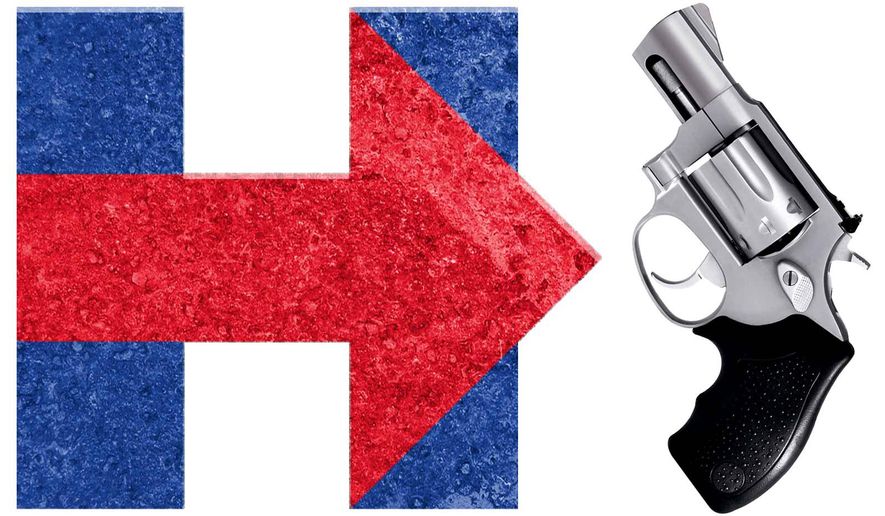OPINION:
Earlier this year when Republican presidential candidate Donald Trump and the National Rifle Association’s Wayne LaPierre addressed the NRA’s annual meeting both claimed that if she ever becomes president, Hillary Clinton will do all in her power to eviscerate or, in Mr. Trump’s words, “abolish” the Second Amendment to the Constitution. Mrs. Clinton and her supporters called the charges lies and claim there is no evidence that she wants to do either.
While one has to parse every word uttered by Mrs. Clinton to find where she really stands, her position on the individual right of Americans to “keep and bear arms” is far clearer than she might like it to be, which may explain why in a recent national poll 38 percent of Americans listed an attack on their Second Amendment rights as their “greatest fear.”
Mr. LaPierre claimed, “If she could, Hillary would ban every gun, destroy every magazine [and] put your name on a government registration list.” To do that, however, she would have to change the makeup of the United States Supreme Court. He put the consequences in stark terms: “If she gets her hands on the Supreme Court and stacks it with just one more justice we’ll be kissing our Second Amendment freedom goodbye.”
The charge, claimed Mrs. Clinton and her allies, is absurd, arguing that she had never said she would actually “abolish” the Second Amendment. She and her supporters are right in a very narrow Clintonian sense. One’s reading of her words depends on their meaning as she interprets them. Mrs. Clinton has never said outright that she wants the words of the Second Amendment erased — just reinterpreted in a way that would accomplish exactly the same thing.
What she has said is that the landmark 2008 Supreme Court decision recognizing that the Founders included the Second Amendment in our Bill of Rights to prevent the government from denying citizens the individual right to “keep and bear arms” to defend themselves, their families and their homes was “wrongly decided.” Her later claim in the third debate that she was upset only because all the D.C. government was trying to do was “protect the toddlers” was both disingenuous and had no relation whatever to either the D.C. law or the Supreme Court decision.
The case was District of Columbia v. Heller, and the one question the court addressed in that case was whether the Second Amendment protects an individual right to possess a handgun in the home for self-defense. In a 5-4 decision, the court said it does, with the four dissenting justices arguing that there is no such right. To argue that the case was “wrongly decided” is to argue that no individual in this country has a constitutional right to possess a firearm to defend himself, herself or their family and home. Had the court bought that argument in Heller, the constitutional protection of individual firearms ownership would, in effect, have been abolished.
The progressive left was outraged by the Heller decision and a subsequent decision “incorporating” the guarantees of the Second Amendment through the due process clause so that they, like those found in the First and Fourth Amendments, and other Bill of Rights protections, apply to the states as well as the federal government. Supreme Court Justice Ruth Bader Ginsberg who, like Mrs. Clinton, feels the Heller decision was “wrongly decided,” wants Heller reversed and believes, as do American gun owners, that a Clinton court would reverse it.
Since then, Mrs. Clinton has pivoted to insist that what she really wants is the sort of “common-sense” restrictions on firearms sales, transfers and ownership that President Obama favors, along with a ban on the sale of so-called “assault weapons,” and a ban on the sale of any firearms to those whose names make it on to the government’s various watch lists. She insists that such restrictions are constitutional because as the Supreme Court observed in Heller, even fundamental rights are subject to “reasonable” restriction.
This begs the question of who decides what is and is not “reasonable” when it comes to such restrictions. Even though the First Amendment protecting free speech allows “reasonable” restrictions on that right, the reasonableness of any restriction is decided by the federal courts and makes presidential judicial appointments incredibly important. In Mrs. Clinton’s mind, such “reasonable” restrictions on Second Amendment rights would apparently include not just “universal background checks” and the like, but a complete ban on individual firearms ownership and drastic steps to confiscate firearms now in the hands of Americans. She has lauded the Australian government for its “common-sense” campaign to confiscate privately owned firearms through mandatory “buy-backs” coupled with criminal penalties for those who don’t turn in their guns — a scheme that would be blatantly unconstitutional under Heller.
When asked during the second debate about the sort of person she would appoint to the Supreme Court, her response was completely outcome-oriented. She would appoint justices who share her policy goals while making no reference either to the Constitution or to the Founders’ belief that a free society is as dependent on what government shouldn’t do as on what it should be granted the power to do.
A Clinton court that would do what Mrs. Clinton wants could be expected to do just what Messrs Trump and LaPierre warned about: abolition of the Second Amendment prohibition on government interference with the right of individuals to “keep and bear arms.”
• David A. Keene is opinion editor at The Washington Times and the former president of the National Rifle Association.




Please read our comment policy before commenting.